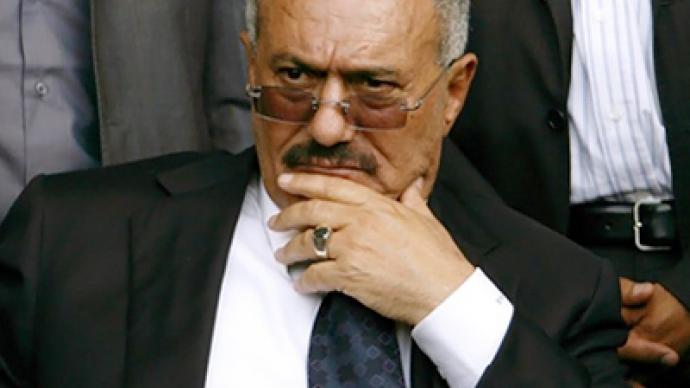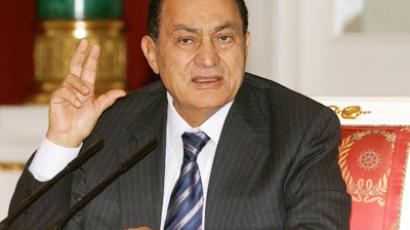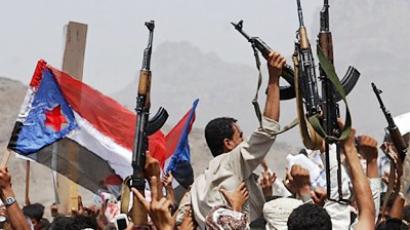Our unrest is a part of the plot against Middle East - Yemeni President

RT exclusively talked to the president of Yemen, Ali Abdullah Saleh, who believes that unrest in the Middle East and North Africa has been fuelled not just by Western powers, but from within the region itself.
Saleh also confirmed that he had agreed to step down in 2011, to put an end to chaos in the country. However, before the interview was aired, Yemeni opposition announced, in the early hours of May 1, that he refused to sign a plan leading to his resignation and a transfer of power.RT: Mr. President, please allow us to hear your opinion as to what caused the current crisis in Yemen and what could have been behind it?Ali Abdullah Saleh: The crisis in Yemen did not occur today. Back in 2006, after the presidential election, differences emerged between the General People’s Congress party and parties of the united opposition.Despite the fact that the election had been transparent and fair and had been monitored by international observers, who reaffirmed it had been fair, the opposition considered it undemocratic and did not accept its result. The discontent was first peaceful, but then it grew along with criticism and rallies.The events in Tunisia and Egypt, due to the coverage of a number of satellite TV channels, first of all Al Jazeera, turned the situation upside down. When covering those events in Tunisia, Egypt and Bahrain, the channel called them “chaos of wrath.” So did the united opposition parties. Civil unrest kept growing day by day – demonstrations, blockading of roads, disruptions in delivery of gas and oil products from Mareb, exploded oil pipelines – all of which was used by the opposition to aggravate the crisis. The population, on the contrary, expressed its discontent about the growing chaos and unrest, but not the disruptions in gas supplies delivery. Citizens demanded that the blockades of roads and infringements of law and order should be stopped. Now those individuals who get together on the “Cheating Square” – not “Change Square” – are nothing else but the lowest layers of society.It was only yesterday that we witnessed an attack by them on a tent camp near the city stadium, when about 300 supporters of law and order were injured and five people who had advocated constitutional order were killed. After the destruction of the tent camp, the attackers headed for the TV broadcasting center, in order to destroy it, but were repudiated by law-abiding citizens.Now they are stepping up hysteria and are themselves in a state that makes it impossible to have any dialogue with them. They would not accept proposals for mediation either from prominent local public figures… from tribal leaders, politicians or diplomats from the EU, and from the US ambassador. They insist on my stepping down from my constitutional authority.According to the law, my term expires in 2013. I agreed to step down in 2011, so as to put an end to the chaos and the stand-off in society and to let normal life be restored and the discontent stopped. But they, the opposition parties, don’t agree. They don’t need order.Now, as for the initiatives of the Persian Gulf countries: Their mediation envisages creating a government of national unity to consist of representatives from opposition parties and General People’s Congress and its supporters. We agreed to that as that would lessen the crisis. However, the opposition denied this mediation.They put forward their terms for an agreement: They would agree to the proposal, but later, when the protests and demonstrations have achieved their political demands. There are certain political terms and security terms. First of all, the street protests should be discontinued, and criminals should be handed over to face justice.Rebellions in some parts of the army should be stopped, and the military officials concerned should surrender to the authorities and leave the country. It also concerns civilians who have committed crimes during the protests – they should surrender. I am not mentioning any names, but they are known.The initiative of the Persian Gulf countries represents a consistent system of measures which should be either fully accepted or fully denied. One can’t agree to one provision and disagree to another – it is impossible to jump between provisions.On our part, we hail this initiative and are ready to sign it, with one condition, however. It does not concern the contents of the initiative, but the mediators. A certain mediating country is involved in a conspiracy against our country, and is being in constant touch with the opposition and is financing this crisis. This country is Qatar.Today, Qatar is financing the chaos and unrest in Yemen, Syria, Egypt and, perhaps, all over the Arab world. They have lots of money, but a small population, and they simply don’t know how to spend so much money. They want to be a significant country, though – in the Persian Gulf and in the region in general. To that end, they are using the Al Jazeera TV channel. As you may know, many presenters of this channel have resigned following their disagreement with the policies of the state.The channel lost its professionalism and responsibility, its managers have become mongers and provocateurs for the whole of the Arab world, as well as some European countries. With regret I have to state that this country has become involved in a conspiracy. So we are not going to sign the initiative if Qatar is present.All the foreign ministers of the Cooperation Council of the Arab States of the Gulf suit us as mediators in resolving the crisis – except Qatar. The money from that country has brought about chaos, unrest and bloodshed in Yemen. We do value Yemen blood. We are sorry that that country became part of a conspiracy, not only in Yemen but all over the Arab world.As for the crisis, if we can reach an accord on Monday, May 2, and if reason and common sense prevails, if the opposition obeys the law, we’ll hail the dialogue and the mediation efforts. All the conditions previously discussed will be implemented. We are ready for that.The satellite TV channels that fabricate news are directly involved in creating the crisis. Al Jazeera is particularly notorious about this. Its work has become unprofessional and unsatisfactory.RT: The opposition in Yemen says you first agree to accept the initiative of the Gulf countries, then you speak about constitutional legality and your right to remain at your post until 2013. Are you linking your possible stepping down from your post to the need for achieving an accord on the initiative of the Gulf countries? Or are there other scenarios or mechanisms?AAS: We agreed to accept the initiative first of all for the sake of avoiding bloodshed in the country and return the situation to its natural course in the economy and politics. That is why we accepted the initiative, although it contains signs of an unconstitutional coup.Should those provisions indeed be implemented, we’ll hail it. Should, however, it be implemented selectively, we’ll reject it as strongly as possible. Anyway, we did accept all its provisions and signed it. Now it’s time to bring it to life.I do hope the foreign ministers of the Arab states of the Persian Gulf will work out a mechanism that will enable bringing this agreement to life.RT: Mr. President, when do you think it will be more expedient to transfer your power and what do you think of your political future after you resign?AAS: As for a transfer of power, I agree to what has been proposed in the initiative of the Gulf countries. I have absolutely no objections in this respect. As for my political future, I can say that I will remain chairman of the General People’s Congress party and will be busy with our political work in the party until the next congress, when a new leadership is elected.RT: Are you going to go into politics again? I mean, will your strive for power?AAS: No, I am not. The question of power is over for me in any form. I am not going to stand for president. I will still remain chairman of the party I created in 1982. So I may leave the party only when a new leadership is elected.RT: The opposition accuses you of clamping down on demonstrations and of excessive use of power. What can you say in reply?AAS: It’s not true. It’s them who attack the garrisons and bring unrest. Yesterday alone five citizens were killed and more than 300 injured. Our security forces have no instructions from the authorities to use force. On the contrary, the National Defense Council decided to absolutely ban using force. The opponents, on the contrary, are using force and weapons.RT: How can you assess the positions of regional players, international organizations and superpowers toward the current crisis?AAS: First of all, I would like to thank Russia for its constructive stance at the [UN] Security Council. As far as regional players and Western countries are concerned, they are putting out a feeler and viewing various options of possible further developments. They are trying to determine who is coming next. Actually, they behave in such a way as if everything were decided upon and power has already been transferred to the opposition.The opposition has not yet gained power. There is a wide range of political forces, and the majority is on the side of the General People’s Congress. Our opponents reject the idea of holding presidential and parliamentary elections because they are aware they won’t be able to gain a majority.We proposed to them to hold alternative presidential and parliamentary elections. Our opponents, however, are against holding any elections. As a matter of fact, we are having an unconstitutional coup.They are trying to foist on us their projects and are against a constitutional transfer of power in 2013. We are even ready to agree to their projects, so as to avoid bloodshed, although all these projects are unconstitutional.Some countries in the region and some Western countries are conniving in the trend currently seen in the so-called “New Middle East”… This scenario cannot be called anything but a plot against the region, I believe.To that end, they would stoop to anything.Some political forces sow grains of hatred, revenge and are trying to do whatever they can so as to gain power at any cost. They consider power as a means for profit, but not a heavy burden.RT: Some forces are accusing the Yemeni authorities of restricting the freedom of journalists’ work, both from the opposition and from abroad. What can you say in reply, and what has been the media impact on events in the country?AAS: What restrictions can one talk about, when from Russia alone we have crews from three TV channels working in the country? The only channel whose office we closed is Al Jazeera’s, because it distorted reality by showing archive footage instead of real events and by manifesting an absolute lack of professionalism. We truly regret having to state this.Earlier we had granted this channel all kinds of preferences. Now this channel has become mendacious. Yes, mendacious. And those who are behind this channel are mendacious also. The staff is mendacious. They distort the facts. These people are responsible for the bloodshed on the streets of cities in Yemen. It is Al Jazeera that is to blame for the current unrest in Yemen and the Arab world at large.RT: Yemeni society is split. It’s hard to tell which side has a majority. The actions of your former supporter, General Ali Mohsen al-Ahmar [Saleh’s half-brother]. What is your evaluation of his actions – are such splits posing a danger for Yemen’s future and its territorial integrity?AAS: He came over to the rebels’ side having witnessed all this tumult in the university area. He saw people speaking out, proclaiming revolutionary slogans, dancing. He decided the regime would very soon fall and decided to join the young rebels in order to save his hide. He is part of the regime, isn’t he? He came over to the rebels to save himself.RT: Mr. President, the opposition accuses you of intolerance toward Yemeni women. In particular, it is said that in a number of your speeches you reproached Yemeni women for violating traditions and customs. What’s your comment?AAS: One cannot call this an accusation against Yemeni women. A Yemeni woman is a sister, mother and daughter. It really was a rejection of the demands from the Muslim Brotherhood that single-sex education should be established at schools, which I questioned.We did not blame the Yemeni woman. It was a question of statements by the [Yemeni] Congregation for Reform [Al-Islah], which argued that boys and girls should be taught separately at schools. As for us, we are for mixed-sex education. By no means do we blame the Yemeni woman. She is noble and fair. It happens, however, that women are used for political purposes. We do not criticize nor blame Yemeni women. We are against political statements from the Muslim Brotherhood, the so-called reformers.RT: Given I am speaking on behalf of Russia’s media, could you share your opinion about the relations between Russia and Yemen, as well as their prospects either under your rule or another government?AAS: Russian-Yemeni relations have long been based on mutual interests, friendship and agreements. They are not going to be affected at all. Russia’s position at the [UN] Security Council is ample proof of that. It was a positive, well-balanced position. The entire Yemeni people respect it.RT: To sum it up, what would you tell the united opposition forces and the Yemeni youth movement?AAS: The youth movement consists of young people who are members of the united opposition. As for the youth itself, they are on our side. I would like to tell the opposition the following: “Return to dialogue, mutual understanding and reconciliation. The interests of the Yemeni state supersede all partisan and political interests. I am appealing to you for mutual understanding, and a fair and frank dialogue.”You cannot incite people to protests while you remain indoors yourself. All the leaders of opposition parties don’t go out of their homes.Even Ali Mohsen al-Ahmar has constantly been in a military compound, without being able to go home for lunch, because he is afraid of going outside. Let’s have a dialogue for the sake of the interests of the whole country. These interests are above all. This is what I would say to the opposition.RT: Esteemed President Ali Abdullah Saleh, thank you very much for this opportunity to talk to you at this difficult moment. Thank you for accepting us and answering our questions. Let Allah keep the Yemeni people and the Republic of Yemen and protect it from upheavals.AAS: Thank you all at RT.















